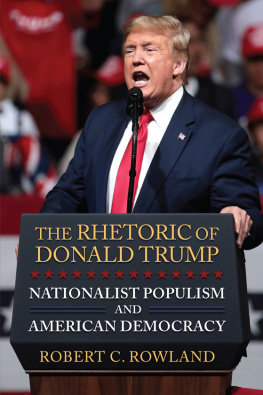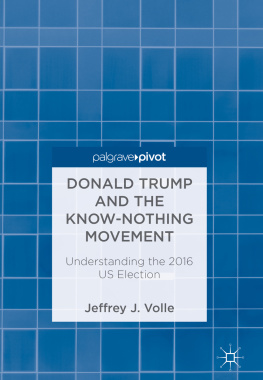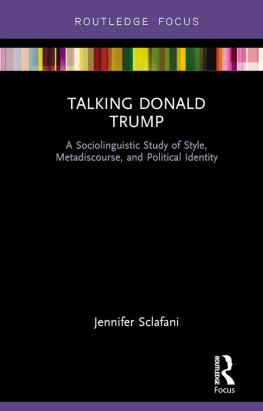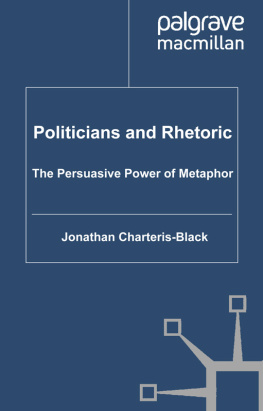What Rhetoric Can Teach Us about Donald J. Trump
All rights reserved. No part of this publication may be reproduced, stored in a retrieval system, or transmitted, in any form or by any means without the prior written permission of the publisher, nor be otherwise circulated in any form of binding or cover other than that in which it is published and without a similar condition being imposed on the subsequent purchaser. Any person who does so may be liable to criminal prosecution and civil claims for damages.
The views and opinions expressed herein belong to the author and do not necessarily reflect those of Imprint Academic or Andrews UK Limited.
Introduction to Faking the News
Ryan Skinnell
For anyone reading this book, Donald J. Trump is undoubtedly a familiar character. Whether you think his election to the US presidency in 2016 was a triumph or a tragedy, the man has been drawing crowds for decades.
Rhetoric, at least as were using it in this book, is probably less familiar. For most people, rhetoric is the opposite of reality, summed up nicely by Teddy Roosevelt in 1917 when he wrote, Rhetoric is a poor substitute for action, and we have trusted only to rhetoric. If we are really to be a great nation, we must not merely talk; we must act big. As Roosevelt helpfully illustrates, rhetoric is often viewed as a form of linguistic deception - pretty or flattering language that disguises peoples real intentions and misleads, or even tricks, audiences.
The definition of rhetoric as deception is useful, especially for understanding politicians. But its also limited. Rhetoric specialists, more commonly called rhetoricians, study rhetoric in broader terms as the art of persuasion in its various forms. As an area of study, rhetoric gives us a set of conceptual tools for studying persuasion. Rhetoric helps to make sense of the world by explaining how people use language (and other persuasive means) to get things done. Rhetoricians study deception, of course, but we also study how speakers and writers increase their authority, how they sway an audience, and how they convince people what to believe and/or how to act.
Rhetoric is not necessarily evil and deceptive, but it is always about how people use language, symbols, and gestures to accomplish (or to try to accomplish) their goals. Saying to your spouse I need you to get milk at the store is rhetorical because you are trying to get someone to do something. It may seem like a silly example, but actually convincing another person to buy you milk at the store is actually a pretty complex set of circumstances. It requires the presence of a relationship and of trust (you dont generally ask a stranger to buy you milk and bring it to your home). It requires shared knowledge (do you usually get whole milk or skim? Gallon or half gallon?). And it requires careful communication (I need it for dinner, so please get it on your way home from work). We take these complicated circumstances for granted, but the more you notice them, the more obvious it is that all human affairs really rely heavily on the effectiveness or not of these sorts of mundane interactions.
When people use language, the purpose is to achieve a particular outcome - whether its getting milk, selling a product, appealing to voters, or taking a country to war. After all, achieving a goal is the whole point of persuasion, whether its persuasion we think is good or persuasion we think is bad. People are constantly using language, symbols, and gestures to get other people to believe or act in certain ways. This is what rhetoric attempts to describe. As a result, studying rhetoric helps us understand a used car dealers shady sales pitch as well as Nazi propaganda, but also the Gettysburg Address and the strategies scientists use to inform the public about new discoveries.
Rhetoric is actually one of Western Civilizations oldest arts. Aristotle wrote a textbook about it almost 2500 years ago. Chaucer, Shakespeare, and Milton all studied it in school. And John Quincy Adams taught it at Harvard in the early 1800s. For as long as formal schooling has existed in Europe and the United States, rhetoric has been a part of the curriculum in some form or fashion, and it still is.
After an extended period of being trapped in the odd college English or Speech-Communications class, the study of rhetoric is making a resounding comeback in the United States. There are more than 70 PhD programs in rhetoric and an ever-growing number of undergraduate and Masters-level degree programs. Most people studying rhetoric in those programs are not (exclusively) studying deception, and the people teaching in rhetoric programs are certainly not teaching students how to be deceptive. Rather, the study of rhetoric is thriving in American colleges and universities because rhetoricians are helping students make sense of important persuasive phenomena in the world. The possibilities for studying persuasion are endless. They include social media and virality, globalization, marketing, technology, celebrity and pop culture, and, of course, national and international politics. Students encounter and practice thousands of different kinds of persuasion every day. Rhetoric gives them a particular set of skills for doing so thoughtfully.
Rhetoricians obviously think rhetorics revival in higher education is important for helping students navigate an increasingly complex educational world. Students can access millions of conflicting sources on 20 th -century Russian politics from their dorm rooms at 3:00am on any given day of the week. They can text or private message a struggling friend to set up a study date in the library. They can email a professor at a different university in another state with questions about a research project. And, they can teleconference with college students in Islamabad, Pakistan for a discussion on the benefits and drawbacks of cross-cultural art cooperatives. Understanding persuasion in each of these cases is really useful because it can help students make smart choices about how to accomplish their varying persuasive goals.
But, properly understood, rhetoric also has much to offer people who are not students or not just students. Rhetoric is closely linked to citizenship, democracy, and justice. Thats why it has existed for thousands of years. Literally, the first rhetoric handbooks were written to help citizens in Ancient Greece participate in the first democracy.
Persuasion plays a particularly important role in democracies because of how central it is to making the government work. Politicians have to persuade voters, policymakers have to persuade members of other parties, lawyers have to persuade jurors, and citizens have to contribute to all of those processes in various ways. In dictatorships, decisions do not require any input beyond the dictators. But in democracies, citizens have to participate knowledgeably in the government to make it work. Which means, they need to understand how persuasion works and how to be persuasive. Being an active member of a democracy requires citizens (as well as non-citizens, for that matter) to understand how other people are attempting to inform, motivate, and persuade them - for good or ill. How do you know which candidate to vote for? How should you evaluate evidence if youre on a jury? What are the possible effects of a ballot measure or a proposition? Knowing these things helps people make better choices.









